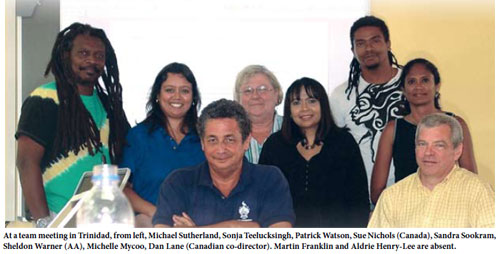 |
 |
 |
|
July 2009
|
UWI Team receives Can$ 2 million GrantAn international research team co-directed by Professor Patrick Watson, Director of the Sir Arthur Lewis Institute of Social and Economic Studies (SALISES) at The University of the West Indies (UWI), will participate in a unique $2 million international research partnership that will respond to pressing environmental issues in Canada and the Caribbean. In partnership with the Canadian Fisheries, Oceans and Aquaculture Management (C-FO AM) at the University of Ottawa, the UWI/SALI SES team will execute a project entitled “Managing adaptation to environmental change in coastal communities: Canada and the Caribbean.” The project was awarded the grant by the International Community-University Research Alliance programme (ICURA), a collaboration between the Social Sciences and Humanities Research Council (SSHRC) and the International Development Research Centre (IDRC). ICURA awarded a research grant of just under CAN $2 million over a five-year period. Approximately half of the sum awarded will be allocated to UWI/SALISES. The UWI/SALI SES team is headed by Professor Patick Watson, and includes researchers Dr Michael Sutherland, Dr Michelle Mycoo, Dr Sandra Sookram, Dr Sonja Teelucksingh, Dr Aldrie Henry- Lee and Martin Franklin A team of 16 researchers, led by C-FO AM Research Associate, Professor Daniel Lane and Professor Watson, along with 17 partner organisations, will work to develop new insights on how protected areas can maximise the delivery of equitable benefits, how to manage human-wildlife interactions and improve the governance of protected areas. Most importantly, the project aims to mobilise knowledge-sharing among academic researchers and community organisations. The project will focus on vulnerable coastal communities whose livelihoods will be most affected by these changes. The selected communities are located in the Caribbean and in Canada’s Atlantic, Pacific and Arctic regions. Within these regions, particular attention is given to the impact of rising sea-levels and storm surges.The research teams aim to build the capacity of local communities to face the inevitable consequences of climate changes and will develop community awareness of the environmental threat, proposals for new infrastructure and tools for creating adaptation and mitigation strategies. “This initiative illustrates superbly how social sciences and humanities research can have a direct impact on societies through communityuniversity partnerships,” said Chad Gaffield, President of SSHRC. “The ICURA programme is funding leading-edge international research collaborations that will bring global perspectives to the analysis and understanding of social, economic, environmental and technological issues.” The SALI SES/C-FO AM project was one of four successful projects to receive funding from ICURA, which was designed to benefit projects in the developing world to undertake research on global issues. The three other successful research projects, selected from over 100 applications through a rigorous peer-review process, will focus on the impact of poverty on the environment, services for at-risk youth, and mental health.
|

